Here is our list of ranked U.S. Presidents. Enjoy!
1. Franklin D. Roosevelt
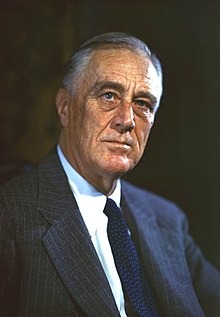
Franklin Delano Roosevelt (/ˈdɛlənoʊ/;[1][2] /ˈroʊzəˌvɛlt, -vəlt/[3][4] ROH-zə-velt, -vəlt; January 30, 1882 – April 12, 1945), often referred to by his initials FDR, was an American politician and attorney who served as the 32nd president of the United States from 1933 until his death in 1945. As a member of the Democratic Party, he won a record four presidential elections and became a central figure in world events during the first half of the 20th century. Roosevelt directed the federal government during most of the Great Depression, implementing his New Deal domestic agenda in response to the worst economic crisis in U.S. history. As a dominant leader of his party, he built the New Deal Coalition, which defined modern liberalism in the United States throughout the middle third of the 20th century. His third and fourth terms were dominated by World War II, which ended shortly after he died in office.
2. Abraham Lincoln
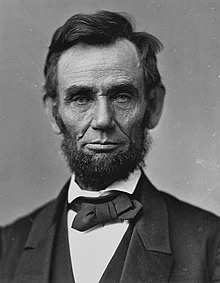
Abraham Lincoln (/ˈlɪŋkən/ LINK-ən; February 12, 1809 – April 15, 1865) was an American lawyer and statesman who served as the 16th president of the United States from 1861 until his assassination in 1865. Lincoln led the nation through the American Civil War and succeeded in preserving the Union, abolishing slavery, bolstering the federal government, and modernizing the U.S. economy.
3. George Washington

George Washington (February 22, 1732[b] – December 14, 1799) was an American military officer, statesman, and Founding Father who served as the first president of the United States from 1789 to 1797. Appointed by the Continental Congress as commander of the Continental Army, Washington led the Patriot forces to victory in the American Revolutionary War and served as the president of the Constitutional Convention of 1787, which created the Constitution of the United States and the American federal government. Washington has been called the "Father of the Nation" for his manifold leadership in the formative days of the country.[10]
4. Thomas Jefferson
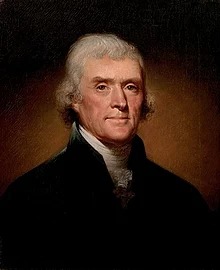
Thomas Jefferson (April 13, 1743[a] – July 4, 1826) was an American statesman, diplomat, lawyer, architect, philosopher, and Founding Father who served as the third president of the United States from 1801 to 1809. He was previously the second vice president under John Adams and the first United States secretary of state under George Washington. The principal author of the Declaration of Independence, Jefferson was a proponent of democracy, republicanism, and individual rights, motivating American colonists to break from the Kingdom of Great Britain and form a new nation. He produced formative documents and decisions at state, national, and international levels.
5. Theodore Roosevelt Jr.

Theodore Roosevelt Jr. (/ˈroʊzəvɛlt/ ROH-zə-velt;[b] October 27, 1858 – January 6, 1919), often referred to as Teddy or by his initials, T. R., was an American politician, statesman, soldier, conservationist, naturalist, historian, and writer who served as the 26th president of the United States from 1901 to 1909. He previously served as the 25th vice president under President William McKinley from March to September 1901 and as the 33rd governor of New York from 1899 to 1900. Having assumed the presidency after McKinley's assassination, Roosevelt emerged as a leader of the Republican Party and became a driving force for anti-trust and Progressive policies.
6. Dwight D. Eisenhower
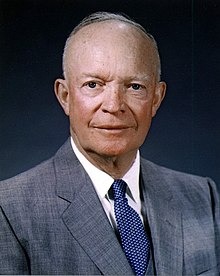
Dwight David "Ike" Eisenhower (born David Dwight Eisenhower; /ˈaɪzənhaʊ.ər/; October 14, 1890 – March 28, 1969) was an American military officer and statesman who served as the 34th president of the United States from 1953 to 1961. During World War II, he served as Supreme Commander of the Allied Expeditionary Force in Europe, and achieved the five-star rank of General of the Army. He planned and supervised the invasion of North Africa in Operation Torch in 1942–1943 and the invasion of Normandy (D-Day) from the Western Front in 1944–1945.
7. Harry S. Truman
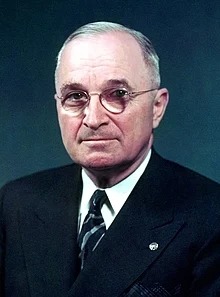
Harry S. Truman[b] (May 8, 1884 – December 26, 1972) was the 33rd president of the United States, serving from 1945 to 1953. A member of the Democratic Party, he previously served as the 34th vice president from January to April 1945 under Franklin Roosevelt and as a United States Senator from Missouri from 1935 to January 1945. Having assumed the presidency after Roosevelt's death, Truman implemented the Marshall Plan to rebuild the economy of Western Europe and established both the Truman Doctrine and NATO to contain the expansion of communism. He proposed numerous liberal domestic reforms, but few were enacted by the Conservative Coalition which dominated the Congress.
8. Lyndon B. Johnson
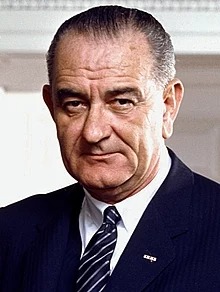
Lyndon Baines Johnson (/ˈlɪndən ˈbeɪnz/; August 27, 1908 – January 22, 1973), often referred to by his initials LBJ, was an American politician who served as the 36th president of the United States from 1963 to 1969. He had previously served as the 37th vice president from 1961 to 1963 under President John F. Kennedy, and was sworn in shortly after Kennedy's assassination. A Democrat from Texas, Johnson also served as a U.S. representative, U.S. senator and the Senate's majority leader. He holds the distinction of being one of the few presidents who served in all elected offices at the federal level.
9. John F. Kennedy

John Fitzgerald Kennedy (May 29, 1917 – November 22, 1963), often referred to by his initials JFK and the nickname Jack, was an American politician who served as the 35th president of the United States from 1961 until his assassination near the end of his third year in office. Kennedy was the youngest person to assume the presidency by election. He was also the youngest president at the end of his tenure.[2] Kennedy served at the height of the Cold War, and the majority of his work as president concerned relations with the Soviet Union and Cuba. A Democrat, he represented Massachusetts in both houses of the U.S. Congress prior to his presidency.
10. James Madison

James Madison Jr. (March 16, 1751[b] – June 28, 1836) was an American statesman, diplomat, and Founding Father. He served as the fourth president of the United States from 1809 to 1817. Madison is hailed as the "Father of the Constitution" for his pivotal role in drafting and promoting the Constitution of the United States and the Bill of Rights.
11. John Adams

John Adams (October 30, 1735[a] – July 4, 1826) was an American statesman, attorney, diplomat, writer, and Founding Father who served as the second president of the United States from 1797 to 1801. Before his presidency, he was a leader of the American Revolution that achieved independence from Great Britain and during the war, served as a diplomat in Europe. He was twice elected vice president, serving from 1789 to 1797 in a prestigious role with little power. Adams was a dedicated diarist and regularly corresponded with many important contemporaries, including his wife and adviser Abigail Adams as well as his friend and rival Thomas Jefferson.
12. James Monroe
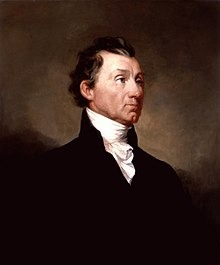
James Monroe (/mənˈroʊ/ mən-ROH; April 28, 1758 – July 4, 1831) was an American statesman, lawyer, diplomat and Founding Father who served as the fifth president of the United States from 1817 to 1825. A member of the Democratic-Republican Party, Monroe was the last president of the Virginia dynasty and the Republican Generation; his presidency coincided with the Era of Good Feelings, concluding the First Party System era of American politics. He is perhaps best known for issuing the Monroe Doctrine, a policy of opposing European colonialism in the Americas while effectively asserting U.S. dominance, empire, and hegemony in the hemisphere. He also served as governor of Virginia, a member of the United States Senate, U.S. ambassador to France and Britain, the seventh Secretary of State, and the eighth Secretary of War.
13. Barack Obama

Barack Hussein Obama II (/bəˈrɑːk huːˈseɪn oʊˈbɑːmə/ (![]() listen) bə-RAHK hoo-SAYN oh-BAH-mə;[1] born August 4, 1961) is an American politician who served as the 44th president of the United States from 2009 to 2017. A member of the Democratic Party, he was the first African-American president of the United States.[2] Obama previously served as a U.S. senator from Illinois from 2005 to 2008 and as an Illinois state senator from 1997 to 2004.
listen) bə-RAHK hoo-SAYN oh-BAH-mə;[1] born August 4, 1961) is an American politician who served as the 44th president of the United States from 2009 to 2017. A member of the Democratic Party, he was the first African-American president of the United States.[2] Obama previously served as a U.S. senator from Illinois from 2005 to 2008 and as an Illinois state senator from 1997 to 2004.
14. Bill Clinton

William Jefferson Clinton (né Blythe III; born August 19, 1946) is an American politician who served as the 42nd president of the United States from 1993 to 2001. He previously served as governor of Arkansas from 1979 to 1981 and again from 1983 to 1992, and as attorney general of Arkansas from 1977 to 1979. A member of the Democratic Party, Clinton became known as a New Democrat, as many of his policies reflected a centrist "Third Way" political philosophy. He is the husband of Hillary Clinton, who was a senator from New York from 2001 to 2009, secretary of state from 2009 to 2013 and the Democratic nominee for president in the 2016 presidential election.
15. Woodrow Wilson
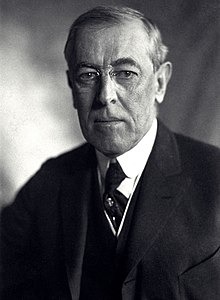
Thomas Woodrow Wilson (December 28, 1856 – February 3, 1924) was an American politician and academic who served as the 28th president of the United States from 1913 to 1921. A member of the Democratic Party, Wilson served as the president of Princeton University and as the governor of New Jersey before winning the 1912 presidential election. As president, Wilson changed the nation's economic policies and led the United States into World War I in 1917. He was the leading architect of the League of Nations, and his progressive stance on foreign policy came to be known as Wilsonianism.
16. James K. Polk

James Knox Polk (November 2, 1795 – June 15, 1849) was the 11th president of the United States, serving from 1845 to 1849. He previously was the 13th speaker of the House of Representatives (1835–1839) and ninth governor of Tennessee (1839–1841). A protégé of Andrew Jackson, he was a member of the Democratic Party and an advocate of Jacksonian democracy. Polk is chiefly known for extending the territory of the United States through the Mexican–American War; during his presidency, the United States expanded significantly with the annexation of the Republic of Texas, the Oregon Territory, and the Mexican Cession following American victory in the Mexican–American War.
17. John Quincy Adams
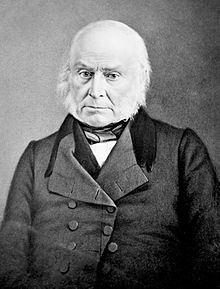
John Quincy Adams (/ˈkwɪnzi/ (![]() listen);[a] July 11, 1767 – February 23, 1848) was an American statesman, diplomat, lawyer, and diarist who served as the sixth president of the United States, from 1825 to 1829. He previously served as the eighth United States Secretary of State from 1817 to 1825. During his long diplomatic and political career, Adams also served as an ambassador, and as a member of the United States Congress representing Massachusetts in both chambers. He was the eldest son of John Adams, who served as the second president of the United States from 1797 to 1801, and First Lady Abigail Adams. Initially a Federalist like his father, he won election to the presidency as a member of the Democratic-Republican Party, and in the mid-1830s became affiliated with the Whig Party.
listen);[a] July 11, 1767 – February 23, 1848) was an American statesman, diplomat, lawyer, and diarist who served as the sixth president of the United States, from 1825 to 1829. He previously served as the eighth United States Secretary of State from 1817 to 1825. During his long diplomatic and political career, Adams also served as an ambassador, and as a member of the United States Congress representing Massachusetts in both chambers. He was the eldest son of John Adams, who served as the second president of the United States from 1797 to 1801, and First Lady Abigail Adams. Initially a Federalist like his father, he won election to the presidency as a member of the Democratic-Republican Party, and in the mid-1830s became affiliated with the Whig Party.
18. Ronald Reagan

Ronald Wilson Reagan (/ˈreɪɡən/ RAY-gən; February 6, 1911 – June 5, 2004) was an American politician who served as the 40th president of the United States from 1981 to 1989. A member of the Republican Party from 1962 onward, he served as the 33rd governor of California from 1967 to 1975 prior to his presidency, after having a career as a Hollywood actor and union leader.
19. Joe Biden
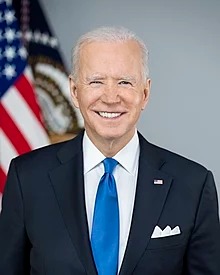
Joseph Robinette Biden Jr. (/ˈbaɪdən/ (![]() listen) BY-dən; born November 20, 1942) is an American politician who is the 46th and current president of the United States. A member of the Democratic Party, he previously served as the 47th vice president from 2009 to 2017 under President Barack Obama and represented Delaware in the United States Senate from 1973 to 2009.
listen) BY-dən; born November 20, 1942) is an American politician who is the 46th and current president of the United States. A member of the Democratic Party, he previously served as the 47th vice president from 2009 to 2017 under President Barack Obama and represented Delaware in the United States Senate from 1973 to 2009.
20. George H. W. Bush

George Herbert Walker Bush[a] (June 12, 1924 – November 30, 2018) was an American politician, diplomat,[2] and businessman who served as the 41st president of the United States from 1989 to 1993. A member of the Republican Party, he previously served as the 43rd vice president from 1981 to 1989 under President Ronald Reagan, in the U.S. House of Representatives, as U.S. Ambassador to the United Nations, and as Director of Central Intelligence.
21. Ulysses S. Grant

Ulysses S. Grant (born Hiram Ulysses Grant /ˈhaɪrəm juːˈlɪsiːz/ HY-rəm yoo-LISS-eez; April 27, 1822 – July 23, 1885) was an American military officer and politician who served as the 18th president of the United States from 1869 to 1877. As Commanding General, he led the Union Army to victory in the American Civil War in 1865 and thereafter briefly served as Secretary of War. Later, as president, Grant was an effective civil rights executive who signed the bill that created the Justice Department and worked with Radical Republicans to protect African Americans during Reconstruction.
22. William McKinley
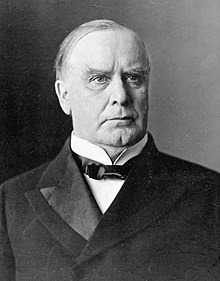
William McKinley (January 29, 1843 – September 14, 1901) was the 25th president of the United States, serving from 1897 until his assassination in 1901. He was president during the Spanish–American War of 1898, raised protective tariffs to boost American industry, and rejected the expansionary monetary policy of free silver, keeping the nation on the gold standard.
23. Andrew Jackson
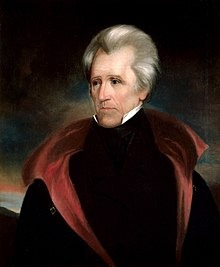
Andrew Jackson (March 15, 1767 – June 8, 1845) was an American lawyer, planter, general, and statesman who served as the seventh president of the United States from 1829 to 1837. Before being elected to the presidency, Jackson gained fame as a general in the United States Army and served in both houses of the U.S. Congress. Although often praised as an advocate for ordinary Americans and for his work in preserving the union of states, Jackson has also been criticized for his racial policies, particularly his role in the forced removal of tens of thousands of Native Americans from their ancestral homelands.
24. Jimmy Carter

James Earl Carter Jr. (born October 1, 1924) is an American former politician who served as the 39th president of the United States from 1977 to 1981. A member of the Democratic Party, he previously served as the 76th governor of Georgia from 1971 to 1975 and as a Georgia state senator from 1963 to 1967. Since leaving office, Carter has remained engaged in political and social projects, receiving the Nobel Peace Prize in 2002 for his humanitarian work.
25. William Howard Taft
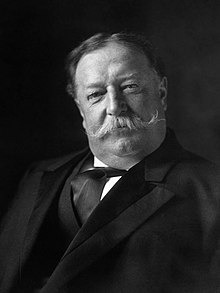
William Howard Taft (September 15, 1857 – March 8, 1930) was the 27th president of the United States (1909–1913) and the tenth chief justice of the United States (1921–1930), the only person to have held both offices. Taft was elected president in 1908, the chosen successor of Theodore Roosevelt, but was defeated for reelection in 1912 by Woodrow Wilson after Roosevelt split the Republican vote by running as a third-party candidate. In 1921, President Warren G. Harding appointed Taft to be chief justice, a position he held until a month before his death.
26. Grover Cleveland
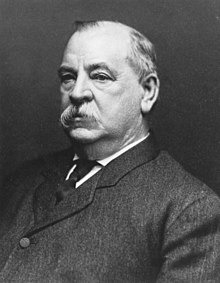
Stephen Grover Cleveland (March 18, 1837 – June 24, 1908) was an American lawyer and politician who served as the 22nd and 24th president of the United States from 1885 to 1889 and from 1893 to 1897. Cleveland is the only president in American history to serve two non-consecutive terms in office.[b] He won the popular vote for three presidential elections—in 1884, 1888, and 1892—and was one of two Democrats (followed by Woodrow Wilson in 1912) to be elected president during the era of Republican presidential domination dating from 1861 to 1933.
27. James A. Garfield
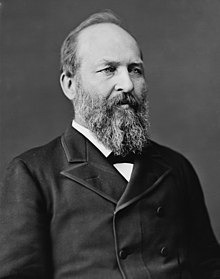
James Abram Garfield (November 19, 1831 – September 19, 1881) was the 20th president of the United States, serving from March 4, 1881, until his death six months later, two months after he was shot by an assassin. A lawyer and Civil War general, he served nine terms in the House of Representatives and was the only sitting member of the House to be elected president. Before his candidacy for the White House, he had been elected to the U.S. Senate by the Ohio General Assembly, a position he declined when he became president-elect.
28. Richard Nixon

Richard Milhous Nixon (January 9, 1913 – April 22, 1994) was the 37th president of the United States, serving from 1969 to 1974. A member of the Republican Party, he previously served as a representative and senator from California and was the 36th vice president from 1953 to 1961 under President Dwight D. Eisenhower. His five years in the White House saw reduction of U.S. involvement in the Vietnam War, détente with the Soviet Union and China, the first manned Moon landings, and the establishment of the Environmental Protection Agency and Occupational Safety and Health Administration. Nixon's second term ended early, when he became the only president to resign from office, following the Watergate scandal.
29. Martin Van Buren

Martin Van Buren (/væn ˈbjʊərən/ van BYURE-ən; Dutch: Maarten van Buren; (Dutch pronunciation: [ˈmaːrtə(ɱ) vɑm ˈbyːrə(n)] ![]() ); December 5, 1782 – July 24, 1862) was an American lawyer and statesman who served as the eighth president of the United States from 1837 to 1841. A founder of the Democratic Party, he had previously served as the ninth governor of New York, the tenth United States secretary of state, and the eighth vice president of the United States. Later in his life, Van Buren emerged as an elder statesman and an important anti-slavery leader who led the Free Soil Party ticket in the 1848 presidential election.
); December 5, 1782 – July 24, 1862) was an American lawyer and statesman who served as the eighth president of the United States from 1837 to 1841. A founder of the Democratic Party, he had previously served as the ninth governor of New York, the tenth United States secretary of state, and the eighth vice president of the United States. Later in his life, Van Buren emerged as an elder statesman and an important anti-slavery leader who led the Free Soil Party ticket in the 1848 presidential election.
30. Gerald Ford
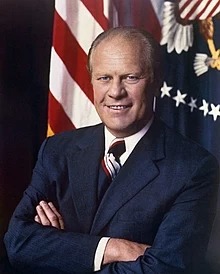
Gerald Rudolph Ford Jr. (/ˈdʒɛrəld/ JERR-əld;[1] born Leslie Lynch King Jr.; July 14, 1913 – December 26, 2006) was an American politician who served as the 38th president of the United States from 1974 to 1977. He was the only president never to have been elected to the office of president or vice president. He previously served as the leader of the Republican Party in the House of Representatives, and was appointed to be the 40th vice president in 1973. When President Richard Nixon resigned in 1974, Ford succeeded to the presidency, but was defeated for election to a full term in 1976.
31. Rutherford B. Hayes
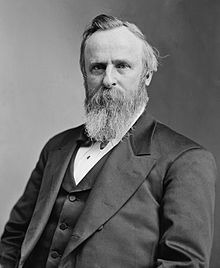
Rutherford Birchard Hayes (/ˈrʌðərfərd/; October 4, 1822 – January 17, 1893) was an American lawyer and politician who served as the 19th president of the United States from 1877 to 1881, after serving in the U.S. House of Representatives and as governor of Ohio. Before the American Civil War, Hayes was a lawyer and staunch abolitionist who defended refugee slaves in court proceedings. He served in the Union Army and the House of Representatives before assuming the presidency.[1] His presidency represents a turning point in U.S. history, as historians consider it the formal end of Reconstruction. Hayes, a prominent member of the Republican "Half-Breed" faction,[2] placated both Southern Democrats and Whiggish Republican businessmen by ending the federal government's involvement in attempting to bring racial equality in the South.[3][4]
32. Calvin Coolidge
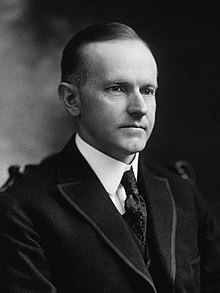
Calvin Coolidge[1] (born John Calvin Coolidge Jr.; /ˈkuːlɪdʒ/; July 4, 1872 – January 5, 1933) was the 30th president of the United States from 1923 to 1929. Born in Vermont, Coolidge was a Republican lawyer from New England who climbed up the ladder of Massachusetts state politics, eventually becoming the state's 48th governor. His response to the Boston Police Strike of 1919 thrust him into the national spotlight as a man of decisive action. He was elected the country's 29th vice president the next year, succeeding the presidency upon the sudden death of President Warren G. Harding in 1923. Elected in his own right in 1924, Coolidge gained a reputation as a small-government conservative and also as a man who said very little and had a dry sense of humor, receiving the nickname "Silent Cal".[2][3] Though his widespread popularity enabled him to run for a third term, he chose not to run again in 1928, remarking that ten years as president was "longer than any other man has had it – too long!"
33. Chester Arthur

Chester Alan Arthur (October 5, 1829[b] – November 18, 1886) was an American lawyer and politician who served as the 21st president of the United States from 1881 to 1885. Previously the 20th US vice president, he succeeded to the presidency upon the death of President James A. Garfield in September 1881, two months after Garfield was shot by an assassin.
34. Benjamin Harrison
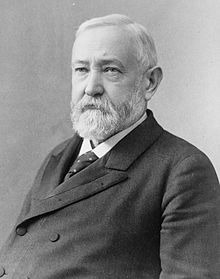
Benjamin Harrison (August 20, 1833 – March 13, 1901) was an American lawyer and politician who served as the 23rd president of the United States from 1889 to 1893. He was a grandson of the ninth president, William Henry Harrison, and a great-grandson of Benjamin Harrison V, a founding father who signed the United States Declaration of Independence.
35. George W. Bush
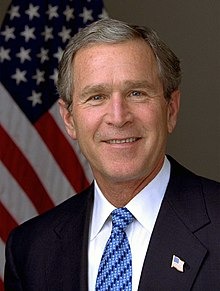
George Walker Bush (born July 6, 1946) is an American politician who served as the 43rd president of the United States from 2001 to 2009. A member of the Republican Party, Bush family, and son of the 41st president George H. W. Bush, he previously served as the 46th governor of Texas from 1995 to 2000.
36. Zachary Taylor
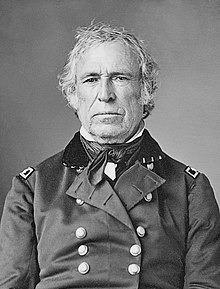
Zachary Taylor (November 24, 1784 – July 9, 1850) was an American military leader who served as the 12th president of the United States from 1849 until his death in 1850. Taylor previously was a career officer in the United States Army, rising to the rank of major general and becoming a national hero as a result of his victories in the Mexican–American War. As a result, he won election to the White House despite his vague political beliefs. His top priority as president was preserving the Union. He died sixteen months into his term, having made no progress on the most divisive issue in Congress, slavery.
37. Herbert Hoover
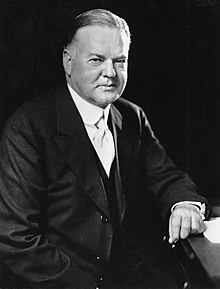
Herbert Clark Hoover (August 10, 1874 – October 20, 1964) was an American politician and engineer who served as the 31st president of the United States from 1929 to 1933 and a member of the Republican Party, holding office during the onset of the Great Depression. Before serving as president, Hoover led the Commission for Relief in Belgium, served as the director of the U.S. Food Administration, and served as the third U.S. secretary of commerce.
38. Millard Fillmore
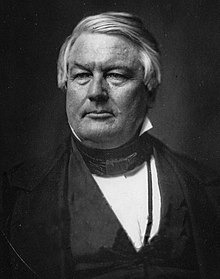
Millard Fillmore (January 7, 1800 – March 8, 1874) was the 13th president of the United States, serving from 1850 to 1853, the last to be a member of the Whig Party while in the White House. A former member of the U.S. House of Representatives from Upstate New York, Fillmore was elected as the 12th vice president in 1848, and succeeded to the presidency in July 1850 upon the death of U.S. President Zachary Taylor. Fillmore was instrumental in the passing of the Compromise of 1850, a bargain that led to a brief truce in the battle over the expansion of slavery. He failed to win the Whig nomination for president in 1852 but gained the endorsement of the nativist Know Nothing Party four years later and finished third in the 1856 presidential election.
39. John Tyler

John Tyler (March 29, 1790 – January 18, 1862) was the tenth president of the United States, serving from 1841 to 1845, after briefly holding office as the tenth vice president in 1841. He was elected vice president on the 1840 Whig ticket with President William Henry Harrison, succeeding to the presidency after Harrison's death 31 days after assuming office. Tyler was a stalwart supporter and advocate of states' rights, including regarding slavery, and he adopted nationalistic policies as president only when they did not infringe on the powers of the states. His unexpected rise to the presidency posed a threat to the presidential ambitions of Henry Clay and other Whig politicians and left Tyler estranged from both of the nation's major political parties at the time.
40. William Henry Harrison

William Henry Harrison (February 9, 1773 – April 4, 1841) was an American military officer and politician who served as the ninth president of the United States. Harrison died just 31 days after his inauguration in 1841, and had the shortest presidency in United States history. He was also the first United States president to die in office, and a brief constitutional crisis resulted as presidential succession was not then fully defined in the United States Constitution. Harrison was the last president born as a British subject in the Thirteen Colonies and was the paternal grandfather of Benjamin Harrison, the 23rd president of the United States.
41. Franklin Pierce
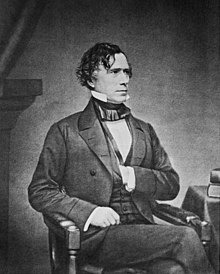
Franklin Pierce (November 23, 1804 – October 8, 1869) was the 14th president of the United States serving from 1853 to 1857. He was a northern Democrat who believed that the abolitionist movement was a fundamental threat to the unity of the nation. He alienated anti-slavery groups by signing the Kansas–Nebraska Act and enforcing the Fugitive Slave Act, and conflict between North and South persisted until southern states seceded and the American Civil War began in 1861.
42. Warren G. Harding
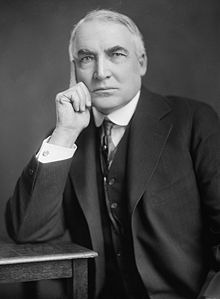
Warren Gamaliel Harding (November 2, 1865 – August 2, 1923) was the 29th president of the United States, serving from 1921 until his death in 1923. A member of the Republican Party, he was one of the most popular sitting U.S. presidents. After his death, a number of scandals were exposed, including Teapot Dome, as well as an extramarital affair with Nan Britton, which diminished his reputation.
43. Donald Trump
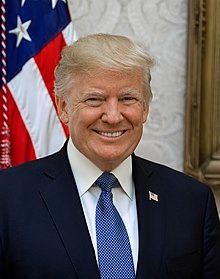
Donald John Trump (born June 14, 1946) is an American politician, media personality, and businessman who served as the 45th president of the United States from 2017 to 2021.
44. James Buchanan
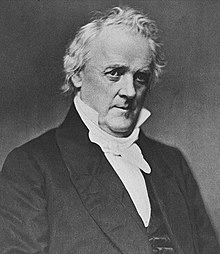
James Buchanan Jr. (/bjuːˈkænən/ bew-KAN-ən;[3] April 23, 1791 – June 1, 1868) was an American lawyer, diplomat and politician who served as the 15th president of the United States from 1857 to 1861. He previously served as secretary of state from 1845 to 1849 and represented Pennsylvania in both houses of the U.S. Congress. He was an advocate for states' rights, particularly regarding slavery, and minimized the role of the federal government preceding the Civil War. Buchanan was the last president born in the 18th century.
45. Andrew Johnson

Andrew Johnson (December 29, 1808 – July 31, 1875) was the 17th president of the United States, serving from 1865 to 1869. He assumed the presidency as he was vice president at the time of the assassination of Abraham Lincoln. Johnson was a Democrat who ran with Lincoln on the National Union ticket, coming to office as the Civil War concluded. He favored quick restoration of the seceded states to the Union without protection for the newly freed people who were formerly enslaved. This led to conflict with the Republican-dominated Congress, culminating in his impeachment by the House of Representatives in 1868. He was acquitted in the Senate by one vote.
